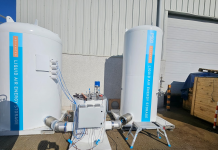Altilium Metals, a UK-based clean technology startup, has selected Teesside as the preferred location for the largest planned recycling facility in the UK for end-of-life electric vehicle (EV) batteries.
With the UK banning the sale of petrol and diesel cars in 2030, the global EV revolution could create more than 11 million tons of battery waste annually by 2030, enough to fill Wembley Stadium almost 20 times every year. The mega-scale recycling plant will transform battery waste from 150,000 EVs a year, providing a secure and sustainable supply of the critical metals needed to support the growing production of EVs in the UK – at a time when global demand for these minerals has never been higher.
For Teesside, the proposed multi-million pound investment is expected to create 100 to 200 high value jobs by 2025 – and further underlines Teesside’s reputation as the UK’s premier location for clean energy and innovation. Hundreds more jobs will be created during the construction, with a projected 18-month build to get the plant up and running. Furthermore, the facility will help attract EV battery manufacturers to the region.
Altilium Metals has secured over £3 million in Government Innovation awards to scale up its proprietary recycling technology in order to meet the exponential demand for critical metals needed for the transition to net zero. The highly efficient process, which is currently being piloted at the company’s recently opened UK Technology Centre, enables these metals to be recovered and supplied back into the EV battery supply chain. This, in turn, leads to significant cost savings in EV battery production and lower carbon emissions compared to the mining of raw materials.
Commenting on the investment, Kamran Mahdavi, CEO, Altilium Metals, said, “We are excited to announce Teesside as the preferred location for Altilium Metal’s first UK recycling plant, as we scale up our technology to help meet the growing demand for critical metals and move towards a circular economy for the battery value chain. The significant volume of end-of-life batteries and scrap from giga-factories expected in the UK requires mega-scale recycling solutions and we look forward to demonstrating the process at scale here on Teesside.
“Until recently, lithium-ion batteries were regarded as hazardous waste, but they can actually serve as valuable sources of raw materials such as lithium, nickel and cobalt. Recycling or “urban mining” will play an important role in making sure these valuable metals are returned to the supply chain in the most environmentally friendly way, rather than ending up as landfill waste.”




